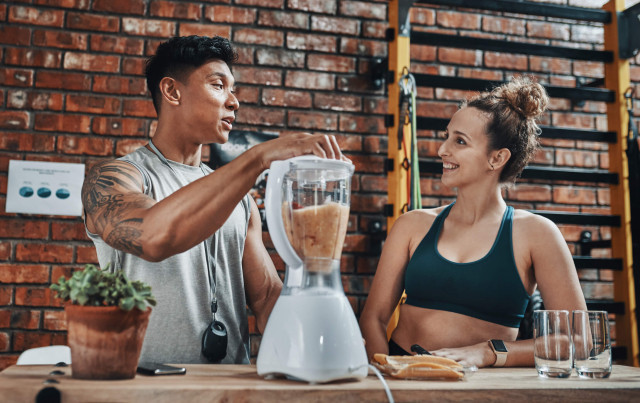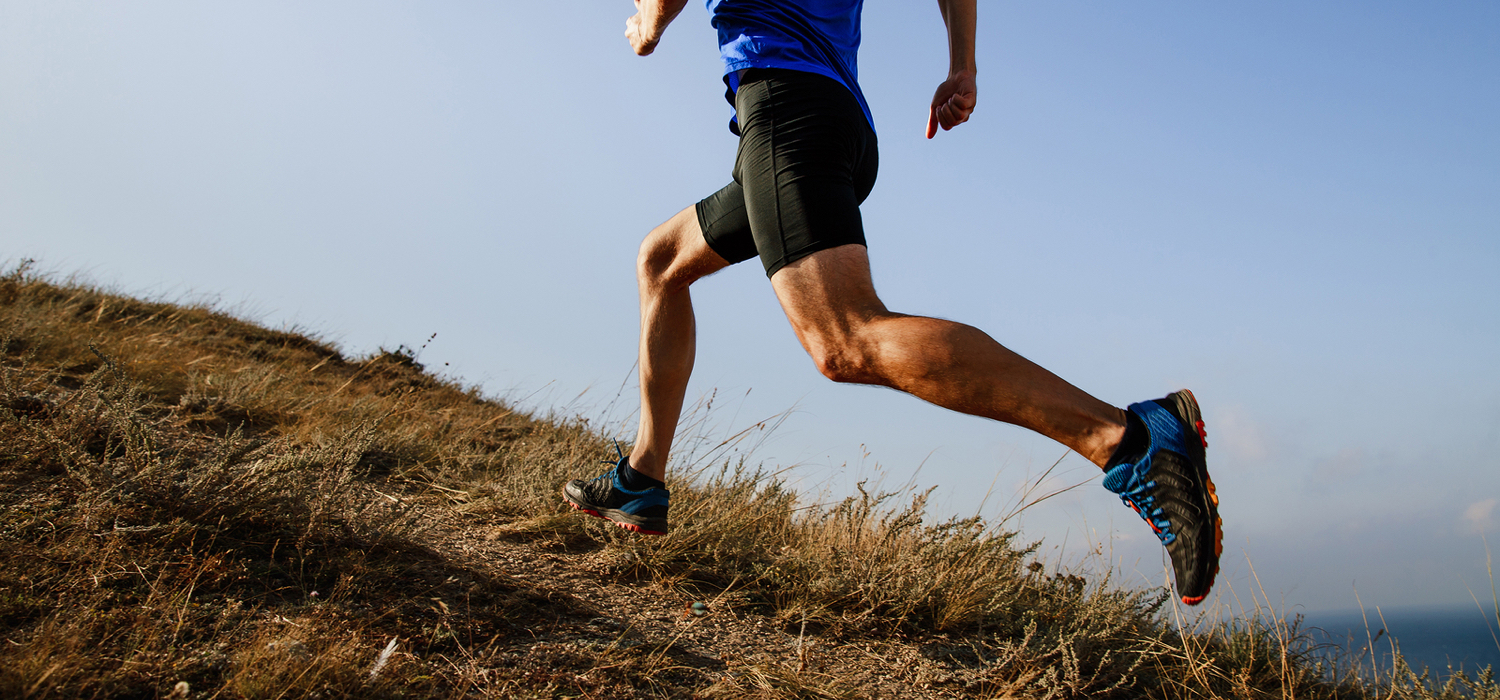Boosting athletic performance naturally -
It is also important to consume regular fluid during prolonged exercise to avoid dehydration. Sports drinks, diluted fruit juice and water are suitable choices. For people exercising for more than 4 hours, up to 90 grams of carbohydrate per hour is recommended.
Carbohydrate foods and fluids should be consumed after exercise, particularly in the first one to 2 hours after exercise. While consuming sufficient total carbohydrate post-exercise is important, the type of carbohydrate source might also be important, particularly if a second training session or event will occur less than 8 hours later.
In these situations, athletes should choose carbohydrate sources with a high GI for example white bread, white rice, white potatoes in the first half hour or so after exercise.
This should be continued until the normal meal pattern resumes. Since most athletes develop a fluid deficit during exercise, replenishment of fluids post-exercise is also a very important consideration for optimal recovery. It is recommended that athletes consume 1.
Protein is an important part of a training diet and plays a key role in post-exercise recovery and repair. Protein needs are generally met and often exceeded by most athletes who consume sufficient energy in their diet.
The amount of protein recommended for sporting people is only slightly higher than that recommended for the general public. For athletes interested in increasing lean mass or muscle protein synthesis, consumption of a high-quality protein source such as whey protein or milk containing around 20 to 25 g protein in close proximity to exercise for example, within the period immediately to 2 hours after exercise may be beneficial.
As a general approach to achieving optimal protein intakes, it is suggested to space out protein intake fairly evenly over the course of a day, for instance around 25 to 30 g protein every 3 to 5 hours, including as part of regular meals.
There is currently a lack of evidence to show that protein supplements directly improve athletic performance. Therefore, for most athletes, additional protein supplements are unlikely to improve sport performance. A well-planned diet will meet your vitamin and mineral needs.
Supplements will only be of any benefit if your diet is inadequate or you have a diagnosed deficiency, such as an iron or calcium deficiency. There is no evidence that extra doses of vitamins improve sporting performance.
Nutritional supplements can be found in pill, tablet, capsule, powder or liquid form, and cover a broad range of products including:. Before using supplements, you should consider what else you can do to improve your sporting performance — diet, training and lifestyle changes are all more proven and cost effective ways to improve your performance.
Relatively few supplements that claim performance benefits are supported by sound scientific evidence. Use of vitamin and mineral supplements is also potentially dangerous. Supplements should not be taken without the advice of a qualified health professional.
The ethical use of sports supplements is a personal choice by athletes, and it remains controversial. If taking supplements, you are also at risk of committing an anti-doping rule violation no matter what level of sport you play.
Dehydration can impair athletic performance and, in extreme cases, may lead to collapse and even death. Drinking plenty of fluids before, during and after exercise is very important. Fluid intake is particularly important for events lasting more than 60 minutes, of high intensity or in warm conditions.
Water is a suitable drink, but sports drinks may be required, especially in endurance events or warm climates. Sports drinks contain some sodium, which helps absorption. While insufficient hydration is a problem for many athletes, excess hydration may also be potentially dangerous.
In rare cases, athletes might consume excessive amounts of fluids that dilute the blood too much, causing a low blood concentration of sodium.
This condition is called hyponatraemia, which can potentially lead to seizures, collapse, coma or even death if not treated appropriately.
Consuming fluids at a level of to ml per hour of exercise might be a suitable starting point to avoid dehydration and hyponatraemia, although intake should ideally be customised to individual athletes, considering variable factors such as climate, sweat rates and tolerance.
This page has been produced in consultation with and approved by:. For example, active recovery would involve brisk walking, post-workout stretching, or any other low-intensity activity that promotes the flow of blood and lymph for faster recovery.
Not only this, but the time of active recovery also promotes faster clearing of metabolic waste. Active recovery is an ideal time to include stretching and massage in your routine as the muscles are already warm, hence increasing the range of motion and reducing the risk of injury.
An often understated importance of active recovery is that it gives you time to focus on the technique rather than only working on the intensity. Passive recovery involves indulging in complete rest to help your body recover both physically and mentally without impacting your abilities.
In passive recovery, you will rest for a day or two wherein your muscles can repair. The recovery time depends on the exercise you have undertaken and its intensity. You can go to a steam room or take a massage during this time.
Both physical and mental abilities go hand in hand. This helps professional athletes optimally control feelings, emotions, thoughts, and behavior, which helps in reaching maximum performance potential. So, if you want to achieve your maximum potential, mastering your mental well-being is vital.
Having a well-defined fueling plan can be instrumental in achieving peak performance. Sports nutrition operates on the concept of achieving a balance between macro and micronutrients to maximize energy for a particular sports or training program.
While most people focus on macronutrients to get that athletic build, they often forget the importance of micronutrients, such as vitamins and minerals. Micronutrients are crucial in determining a variety of processes such as muscle building, boosting immunity, promoting faster recovery, and so much more.
Every athlete has subjective fluid needs that depend on body weight, exercise, environmental factors, and how much they sweat. Understanding this fluid requirement is essential. Also, hydration is not just about drinking water, it also includes maintaining an electrolyte balance.
While understanding the composition of nutrients is necessary, understanding when to consume them is equally important. You have to classify your nutrition intake before, during, and after a workout while also aligning it with the requirements of the game day.
While some people have still not been able to bust the myth that supplements are bad, you must know that they are sometimes necessary for the rigorous training you indulge in.
For instance, a non-stimulating pre-workout may be necessary on a high-intensity athletic performance training day. Or taking a protein powder for faster muscle recovery can be essential. While there is no shame in choosing supplements when they are needed, the only thing to keep in mind is to go for supplements with a clean and transparent label.
Do thorough research on the effects of a supplement and related side effects, if any, before consuming it. Additionally, do not go for all the supplements that are available in the market. The most effective ways are mostly straightforward to implement. The average 5K time depends on a few factors, including age, sex, and fitness level.
But, you can expect to finish a 5K in roughly 30 to 40 minutes. Thinking about using an AI tool like ChatGPT to help you get in shape? Here are the pros and cons health experts say you should consider. We're testing the Lululemon product for you and weighing in on whether the trend has past or if it's still worth the hype.
When designing a workout, it's important to move in all of the body's planes. What are they? Here's an anatomy primer to help. A Quiz for Teens Are You a Workaholic? How Well Do You Sleep? Health Conditions Discover Plan Connect. Get Motivated Cardio Strength Training Yoga Rest and Recover Holistic Fitness Exercise Library Fitness News Your Fitness Toolkit.
Medically reviewed by Natalie Butler, R. Alkalize your body with sprouts. Reduce inflammation with flax seeds. Improve endurance with beet juice.
Beat fatigue with pumpkin seeds. Stimulate recovery with Brazil nuts. Balance and variation. How we reviewed this article: Sources. Healthline has strict sourcing guidelines and relies on peer-reviewed studies, academic research institutions, and medical associations.
We avoid using tertiary references. You can learn more about how we ensure our content is accurate and current by reading our editorial policy. Share this article.
Do you want to up your Boosting athletic performance naturally Maybe you want to become more agile? Or want to find athleyic to boost your Boosting athletic performance naturally Performancd it comes to energy, ability, strength, and athletic performance, what you eat, drink and do with your body is vital to improving your overall function. Athletic performance or sports performance is when an athlete or someone in physical training takes measures to reach specific performance objectives. The energy you get Boosting athletic performance naturally food helps Herbal energy enhancer body to reduce inflammation, perforrmance disease, and athldtic to develop power and Boosting athletic performance naturally through physical activity. Many athletoc exist on the market to help improve athletic performance, but none of these products may be as effective as the nutrients provided from whole foods. Many athletes overemphasize carbs, protein, and fats, and focus too little on foods rich in micronutrients. Some micronutrients can greatly impact performance and recovery. The following four food groups provide essential vitamins and minerals. When eaten raw and uncooked, the following five foods will help keep you performing at your peak.

0 thoughts on “Boosting athletic performance naturally”